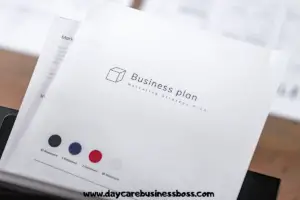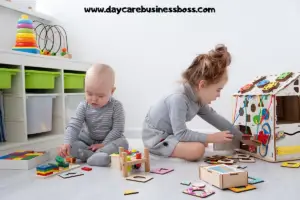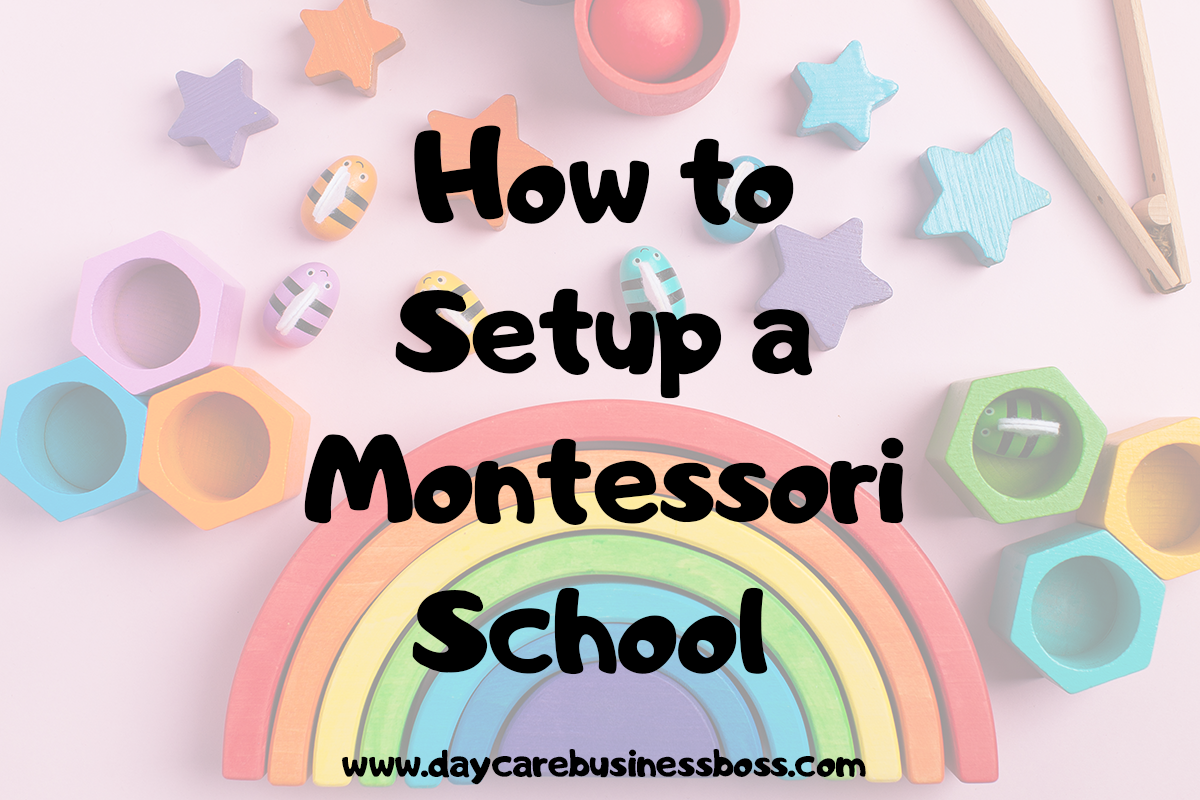In 1911, Dr. Maria Montessori introduced her unique concept of education to the United States. Doctor Montessori believes that children would become better students and more well-rounded people through stability and by learning at their own pace. She founded learning institutions, which are known as Montessori schools. These educational institutions emphasize the individual student, rather than focusing on an entire group. With their unique take on learning, these schools have become quite popular. According to the Montessori website, there are 5,000 schools located in the United States, and 20,000 schools worldwide.
If you were so inclined, you can open your own Montessori School, according to the American Montessori Society. Here’s how:
- Observe classes at different Montessori schools.
- Connect with directors of Montessori schools.
- Get informed about your state’s regulations.
- Write a business plan.
- Acquire the space and materials you will need.
- Find your niche.
- Get Montessori certified.
- Obtain any necessary funding.
- Ensure that all legal matters are in line.
In this article, we are going to closely examine Lee examine each of these steps that must be taken to open a Montessori school. I will go into as much detail as possible, but there are far too many regulations in some of these sections too lathese sections to list all of them.. I will provide links links in those cases.
How Does a Montessori Classroom Operate?
 Before you can open a Montessori School of your own, you are going to have to do a little research to find out how one operates. What better place to start than a Montessori classroom? However, not all Montessori locations operate in the same manner. This is why I would recommend visiting several different locations to see what works, and what doesn’t work, in the classroom. This will be beneficial to you when you are hiring your faculty, as you will get a chance to see the qualities needed by a Montessori teacher firsthand.
Before you can open a Montessori School of your own, you are going to have to do a little research to find out how one operates. What better place to start than a Montessori classroom? However, not all Montessori locations operate in the same manner. This is why I would recommend visiting several different locations to see what works, and what doesn’t work, in the classroom. This will be beneficial to you when you are hiring your faculty, as you will get a chance to see the qualities needed by a Montessori teacher firsthand.
While the basic principles of the Montessori method are universal, most teaching methods are not. Because no two teachers will have identical methods, you would benefit by having your faculty observe the way the faculty operates at a different Montessori School. I know what you’re thinking. Who has the time to take all of their teachers from their classrooms and take them on a field trip? Well, here’s one suggestion that may work. You could even implement this idea into the interview process, as it would be a great way to gauge how your prospective teachers will interact with their students.
What Are Your State’s Montessori Regulations?
 There are going to be more than a handful of state regulations you will have to educate yourself on before opening a Montessori School. There are two ways you can accomplish this. First, you will have to do a little research on your own to find out pertinent information regarding Montessori schools in your state. Next, I would recommend connecting with the directors of any Montessori schools in your area and inquire about this.
There are going to be more than a handful of state regulations you will have to educate yourself on before opening a Montessori School. There are two ways you can accomplish this. First, you will have to do a little research on your own to find out pertinent information regarding Montessori schools in your state. Next, I would recommend connecting with the directors of any Montessori schools in your area and inquire about this.
Let’s not forget that when you decide to set up a Montessori School, you are buying the right to use Dr. Maria Montessori’s name. In essence, you are buying into an established franchise, and there are going to be requirements that must be met. There is also going to be a substantial fee associated with buying into the Montessori School franchise. According to Franchise Gator, you must meet the following requirements before you are approved to buy into the Montessori franchise:
- You must have liquid capital available of at least $200,000
- Your net worth must be more than $300,000
- The cost of buying into the Montessori franchise is anywhere from $700,000 to $3,500,000
What’s Your Business Plan?
 One of the things that successful businesses have in common is that they have developed and implemented a solid business plan. If you are unsure how to draft a business plan, or what to include in your business plan, the Small Business Administration can help you. According to the SBA, your business plan should include your mission statement, your product or service, and basic information about your company’s leadership team, employees, and location.
One of the things that successful businesses have in common is that they have developed and implemented a solid business plan. If you are unsure how to draft a business plan, or what to include in your business plan, the Small Business Administration can help you. According to the SBA, your business plan should include your mission statement, your product or service, and basic information about your company’s leadership team, employees, and location.
If you plan on seeking outside financing, your business plan should also include financial information and high-level growth plans. A business plan is not something that you should have in place just to benefit you. Potential investors are going to want to take a look at your business plan to see what type of business risk or investment you may be. Make sure that your business plan is developed well, and professionally written. Most of all, make sure that you are adhering to what is written in that plan. It’s not just a piece of paper, it is a map to success for your Montessori school.
What Type of Materials and Space Will Your School Need?
Your school is going to need a physical location, and your classrooms are going to need materials and supplies. In this step, you are going to have to scout several different possibilities where your school will be located. Of course, your building is going to have to be located in a school zone. You are also going to need materials for your classrooms. This is where observing classes in different Montessori schools will pay off. You can coordinate with other teachers, and also get a list of classroom supplies. Fortunately, the website and Motherly have provided such a list.
While your school is going to need the necessities required by all schools, your Montessori school is also going to require you to have additional learning materials available in your classroom. According to Montessori Materials, each classroom is going to have to have materials that use manipulatives to achieve abstraction, as well as hands-on material that span across the many different subjects Montessori students will study. One example of this is using bead chains and number boards in mathematics. Another example is having sandpaper letters and movable alphabets for language arts. Montessori schools also Implement sensorial materials such as thermic tiles and pink towers.
What’s Your School’s Niche?
 Now that you have chosen a location for your school, and acquired all of the necessary supplies you will need for your classrooms, your school is going to have to have something that separates it from other schools. Your Montessori school is going to have to have a niche. According to the website niche.com, what separates a Montessori school from traditional schools is that they have an approach to learning that allows the child to learn at their own pace. Stability is also a key factor in Montessori schools, as students tend to stay with the same teacher for several years.
Now that you have chosen a location for your school, and acquired all of the necessary supplies you will need for your classrooms, your school is going to have to have something that separates it from other schools. Your Montessori school is going to have to have a niche. According to the website niche.com, what separates a Montessori school from traditional schools is that they have an approach to learning that allows the child to learn at their own pace. Stability is also a key factor in Montessori schools, as students tend to stay with the same teacher for several years.
While the term “niche” may initially sound gimmicky, you are going to have to have that special something that sets your school apart from all of the other schools in your area. You are going to have to find the key elements that parents appreciate about Montessori schools and center your school’s philosophy around those principles. One of the unexpected advantages of Montessori education is that children with ADHD tend to thrive in the Montessori environment. Your school could be known as the school that parents of children with learning disabilities look to for help.
How Do You Get Montessori Certified?
Now it’s time to get down to brass tacks. You are headed towards the finish line, and it’s time for you to become an accredited Montessori administrator. According to the American Montessori Society, this accreditation is a requirement for all Montessori directors, principals, and program directors. Your teachers are also going to have to become certified in the Montessori method of teaching. There are several online options available for you to become Montessori certified.
Here is a list of all the credentials and endorsements your faculty is going to have to have to be Montessori certified:
- Infant & Toddler (birth – age 3)
- Early Childhood (ages 2 1/2 – 6)
- Elementary I (ages 6 – 9)
- Elementary II (ages 9 – 12)
- Elementary I – II (ages 6 – 12)
- Secondary I (ages 12 – 15)
- Secondary I – II (ages 12 – 18)
- Administrator
- Montessori Inclusion Endorsement (MIE)
Learn the cost of Montessori Certification in 2021?
What Type of Funding Does My Montessori School Need?
 First and foremost, your Montessori school is an educational institution. The primary focus will be on educating your students. However, your school will also be your livelihood. Because your school is a business, you are going to have to have the necessary start-up capital to open the doors. Unfortunately, some people will have to seek outside funding to obtain the necessary funds to open their Montessori schools.
First and foremost, your Montessori school is an educational institution. The primary focus will be on educating your students. However, your school will also be your livelihood. Because your school is a business, you are going to have to have the necessary start-up capital to open the doors. Unfortunately, some people will have to seek outside funding to obtain the necessary funds to open their Montessori schools.
Starting a Montessori school is not exactly easy on the wallet. First of all, you have to have at least $200,000 in liquid capital. Next, you have to have a net worth of at least $300,000 and have a franchise fee of anywhere from $700,000 to $3.5 million. However, if you do not have the full franchise fee, there are several methods to acquiring the money you will need. You can apply for many different grants and loans from the small business administration, or perhaps seek out private investors for your school. Some Montessori franchises offer third-party financing.
Are There Any Legal Concerns With Montessori Schools?
Finally, once you are all ready to open the doors to your Montessori school, you will have to sort through any legal concerns that may be associated with opening a school. One example of this that ties into choosing a location for your school is whether or not the building is located in an area zoned for schools. The information you will need to know regarding state regulations as they apply to Montessori schools can be found on the Justia website. There are also regulations mandated by your state that deal with issues such as what type of discipline you can administer to your students. You can find many of these guidelines on the Supportive Learning website.
As is the case with all schools in your state, some regulations pertain to Montessori schools. While there are far too many regulations to list here, I am going to provide you with the categories in which there are regulations listed. Here are the main categories in which your state will have regulations regarding your Montessori School:
- Administration
- Physical plant
- Environment
- The program
- One Montessori certified teacher for each grade level
- Personal accreditation
Conclusion
As you can see, there are several steps you must take before you can open a Montessori school. The first step you should take is to observe classes at different Montessori locations. Secondly, you should connect with directors of Montessori schools to obtain regulatory information. Next, you should write a business plan for your school. After this, it’s time to choose a location for your school and find out what classroom materials you will need. You should then become Montessori certified, and find your school niche. Next, you will need to get your finances for your Montessori school. Finally, you should make sure that there are no legal matters that need to be cleared before you open your school.
Once you have taken all of these steps, it’s time to open your school and implement Dr. Montessori’s teaching ideologies into your educational institution. You are going to have to invest some time, and put some effort into opening your school. However, all of the time you have invested; the hard work, and the dedication you have put into opening your Montessori school will be worthwhile when your teachers are molding the young minds of your students.
Related Questions
What are the basic principles in Montessori education? Like many other educational institutions, Montessori schools have a set of basic principles that they follow. Here is a list of some of the basic Montessori principles:
- Experiential learning
- Mixed-age classrooms
- Uninterrupted work periods
- Academics
- Role of the teacher
- Freedom within limits
Are all Montessori schools franchises? While some Montessori schools are indeed part of a franchise, most Montessori schools are privately owned. One reason for having a privately owned Montessori school is because Montessori schools are not typically religious. However, some of the privately-owned Montessori schools do Implement religion into their daily curriculum.
Please note: This blog post is for educational purposes only and does not constitute legal advice. Please consult a legal expert to address your specific needs.
To learn more on how to start your own daycare checkout my startup course and documents here.

Meet Shawn Chun: Entrepreneur and Childcare Business Fan.
I’m a happy individual who happens to be an entrepreneur. I have owned several types of businesses in my life from a coffee shop to an import and export business to an online review business plus a few more and now I create online daycare business resources for those interested in starting new ventures. It’s demanding work but I love it. I do it for those passionate about their business and their goals. That’s why when I meet a childcare business owner, I see myself. I know how hard the struggle is to retain clients, find good employees and keep the business growing all while trying to stay competitive.
That’s why I created Daycare Business Boss: I want to help childcare business owners like you build a thriving business that brings you endless joy and supports your ideal lifestyle.


